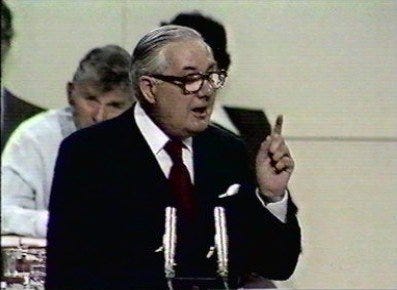It Could Be Said #40 When Will The Next General Election Take Place?
Will's dreaming of an election christmas....
If Rishi Sunak’s successful rollout of the Windsor Framework and Boris Johnson being dragged over the coals by the Privileges Committee have achieved one thing, is that they have persuaded the Tory Press to give up the dream of the Prime Minister being replaced. Hence the increasingly positive coverage that Jonn Elledge enjoyably skewers over at his newsletter.
So, we can now more confidently look forward to a General Election where Rishi Sunak and Sir Keir Starmer spend seven weeks trying to persuade the nation that despite giving up highly successful careers to become politicians, they somehow have no strong ideological convictions, and are instead the type of nice guys who your mum likes, which will only try their best.
But what we don’t know is when that election will take place. And I’d like to outline why I think it will be January 2025.
As a reminder, before the Fixed-Term Parliaments Act was scrapped the next election had been due to take place on Thursday 2nd May 2024. The new legal arrangements says that the election must take place by Thursday 28th January 2025.
The common expectation is that Sunak will not want to go as early as May 2024, nor as late as the following January, but somewhere in between. This makes sense, because if Sunak lost next May he’d (other than Liz Truss) be the shortest serving Prime Minister since Sir Alec Douglas-Home. On the other hand, by all accounts everyone found campaigning in early December miserable due to the weather and people’s resentment at politics interrupting Christmas, both problems that could easily be worse with a January election.
The problem is that it’s easier to choose a date between the twin extremes than it sounds. If people would resent their Christmas being disrupted, then cutting across their summer holidays would be even worse, as we see with the delays that hit every party membership election that straddles July and August. This has led some to speculate that September would be Sunak’s preference, but those sleepy summer days might deprive him of the element of surprise, by forcing him to give longer than usual notice so election administrators can get everything ready. More worryingly for the Tories it would involve holding the elections when many students would have access to their accommodation but no lessons, so making it easier for the progressive parties to mobilise activists in key urban and suburban marginals.
But if you go after September then the party conferences would happen as de facto American-style pre-election conventions. And that raises the possibility that if Labour had a great conference or the Tories have a bad one then the Government is on too badly on the backfoot to quickly call the election. That would inevitably increase the pressure to further delay the election and the deeper into winter you get, the more tempting going into 2025 becomes. Particularly as whilst nobody would enjoy campaigning through December and January, Tory MPs and staffers who know that they are likely not coming back after the election, would surely not object to delaying redundancy until after Christmas. Indeed, for anybody who entered parliament with the 2019 General Election, waiting until January would mean an extra full year’s work can be fed into the calculations for their redundancy package.
That grim realisation that departing MPs and staffers benefit financially from delay would likely race to the forefront of everyone in the Tory Party’s minds from May at the latest. Because a key problem with going after May is that the local elections will likely highlight just how bad the coming defeat for the Tory Party will be, especially as these seats were last defended at Boris Johnson’s peak in 2021. If Sunak was keen to hold the election in June, he could always try to rush through legislation to delay the local elections so they can be held alongside the revised date, but that would require giving the opposition parties advanced notice about when the general election is coming. And it could easily go wrong if backbenchers or the Lords’ cause trouble. And would it really help Sunak retain Blue Wall seats to hold a general election around the anniversary of Brexit?
That brings us back to those twin extremes; May 2024 or January 2025. The advantages with May are that it would be the standard time for an election, swerves the possibility that a bad local elections disrupts the Tories general election preparations, and would come hot off the heels of a pre-election budget that Sunak would hope generate positive news stories for the government. The advantages of January is that it gives more time for the country to rediscover the feel-good factor, ministers more time to push through their pet projects, and lots of doomed Tories several more months of paid employment.
May 2024 would be the bold choice from a decisive man who leads a party that thinks they can win and wants to take control of events. January 2025 would be the defensive choice from a cautious man who leads a party that knows it’s going to lose and wants to maximise what it can get from this parliament.
The Tories talk a big game now but as the moment of decision comes, delay will become all the more attractive, as it did to Gordon Brown, Jim Callaghan, and Alec Douglas-Home. If I was a gambling man, I’d be looking forward to opening my Christmas presents as politicians awkwardly ask for that most precious gift of all; our votes.


